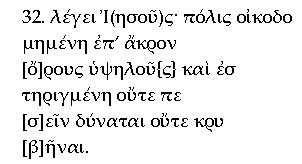Visitor Comments
It seems to me that this saying refers to the strength of faith as "a city built on the summit of a high mountain" and that through that faith, believers can neither be harmed in spirit, nor could they hide their faith.
- Nikole
If you fully understand the true message of Jesus, you cannot forget it. Nor can its effects on you be fully hidden, even deliberately.
- active-mystic
Once integrated the Self is impregnable to the forces which repressed the innate child self and shines like a beacon.
- Rodney
Commentary on the successful pupil's development of the self under the guidance of the teacher. A reassurance
- Thief37
|
Scholarly Quotes
Gerd Ludemann writes: "The saying has a precise equivalent in Greek. It seems overloaded by comparison with the parallel Matt. 5.14. Therefore Logion 32 may be of later date in terms of tradition. Gnostics had no difficulties in seeing themselves as inhabitants of a fortified city which could not be shaken." (Jesus After 2000 Years, p. 606)
Joachim Jeremias writes: "The saying is meant to encourage Jesus' disciples, and preserve them from despondency. They are citizens of the lofty, eschatological city of God (Isa. 2.2-4; Micah 4.1-3), a city which no earthquake, nor hostile onslaught, nor even the Powers of Hell (Math. 16.18), can shake, and whose light streams through the night, needing no human efforts. Having the gospel, they have all they need." (The Parables of Jesus, pp. 217-218)
Joseph A. Fitzmyer writes: "There is no reason why the saying could not be regarded as authentic, but it is more likely a secondary expansion of Mt 5:14. I find it hard to see any connection between this saying and Mt 7:24-25, which has been suggested by various commentators." (Essays on the Semitic Background of the New Testament, p. 403)
R. McL. Wilson writes: "Fitzmyer also regards it as a secondary expansion of Matthew, while Grant and Freedman think it based on Matthew, but that 'it has become mixed up with something else in the course of transmission.' On the other hand Puech notes that Vaganay, working on the basis of the Greek fragment, had already suggested that it came from independent tradition, and he himself suggests that it may be older and more complete than Matthew. Quispel has detected several parallels in other writings, some of them already noted by Harnack and others in their studies of the Greek, and these must lend support to the view that we have here an independent tradition." (Studies in the Gospel of Thomas, p. 61)
Funk and Hoover write: "The underlying saying about a city that cannot be concealed probably goes back to Jesus. It is based on a common sight in the Near East: one sees mounds protruding from the plain or valley floor everywhere; they mark the sites of ancient cities. When a city succumbed to an enemy seige, the new occupants simply leveled off the stones and clay bricks of which the walls and buildings of the previous city had been constructed, and built on top of the debris. Over the centuries the mound (it is called a 'tell') would grow to considerable height since it was held together by the outer walls that were continually reconstructed to fortify the city. The saying about the fortified city on a hill is preserved by both Greek Thomas and Coptic Thomas as an independent saying. Since the original context has been lost in both Matthew and Thomas, we cannot determine what it meant on the lips of Jesus." (The Five Gospels, p. 492)
|

